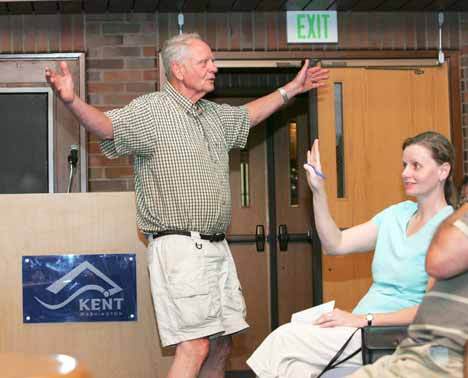The Kent City Council voted 7-0 Tuesday night to approve an ordinance to give downtown developers of multi-family, mixed-use housing complexes of 30 or more units a property-tax waiver of eight years.
The Council expects the waiver to encourage development in the downtown core.
“This is an exemption for a special type of development in a special zone,” Councilman Tim Clark said prior to the vote. “Our purpose is to invite the type of structure we want. It is not trying to simply create more apartments. This will require retail on the bottom floor.”
Two Kent residents spoke against the ordinance – one of them especially outraged.
“Why should we subsidize apartments at Kent Station?” Paul Morford said. “Free enterprise should work on its own. If the market is right, people will build apartments.”
Bob Jordan also opposed the property-tax waiver for new apartment complexes.
“I live in an area that looks over downtown Kent and I’m really worried about more apartments, more people and more traffic,” Jordan said. “It takes three minutes to get into Kent and 15 minutes to get out.”
Morford and Jordan were upset that the Council didn’t allow public testimony before it voted on the tax waiver, which was passed as part of the consent calendar. Both men were allowed to testify during the continued communications part of the agenda right before the end of the meeting.
“It’s falling on deaf ears, it’s too late,” Morford said about his after-the-vote testimony.
Clark told Morford that he had the chance to testify on the ordinance when it went before the Planning and Economic Development Committee earlier in the month.
City officials want developers to build apartments downtown in an effort to meet requirements under the state Growth Management Act. GMA requires cities to provide denser urban housing, to cut back on urban sprawl, as well as to provide a pool of nearby residents to shop at local businesses.
The waiver would apply only to the value of new housing units, meaning developers would still pay taxes on the land and any commercial space they create. To receive the waiver, developers must build the complexes in a downtown-specific area, from Willis Street north to Cloudy Street, and from the east end of Titus Street west to State Route 167.
Bellevue developer Robert Slattery wants to build as many as 170 apartment units on a 1.2-acre site on East Smith Street between Clark and Jason Streets. The six-to-seven-story complex, to be called Station 601, also could include a restaurant and coffee shop on the street-level floor. The apartments would sit across Smith Street from the Kent Senior Activity Center.
Slattery plans to file a permit application with the city later this year. He also plans to seek the property-tax waiver.
In other business:
• The Council voted 4-3 to send a proposed ordinance by Mayor Suzette Cooke to create a new economic and community development department to the Council’s Planning and Economic Development Committee for consideration. Cooke proposed the reorganization in an effort to help attract more developers and businesses to the city.
Cooke proposed on June 2 a new city department that would consolidate the current community development department, the engineering division of public works and the economic development staff of the mayor’s office.
Council members Elizabeth Albertson, Tim Clark, Debbie Raplee and Ron Harmon voted to send the proposed ordinance to the committee for discussion before the full Council considers the ordinance later this month or in July. Jamie Danielson, Deborah Ranniger and Les Thomas voted against the ordinance going to the committee first. They said they were ready to vote on the ordinance.
“This has never gone to a committee,” said Albertson, chairwoman of the Planning and Economic Development Committee. “It just appeared in our (Council) packet. I want a chance to look at it.”
The committee is expected to discuss the organizational change on either June 29 or July 13 at City Hall.
• The Council voted 7-0 to adopt a resolution to formalize an agreement between city and Comcast officials to have the company drop a $1.16-per-month network add-on fee to subscribers starting with this July’s bill.
Comcast began charging that fee in 1999 to help pay for an upgrade to a fiber optic rather than copper-wire cable system. Fiber optics allow transmission over longer distances and at greater bandwidths.
The problem was, the work had since been done and funded, but the company reportedly kept charging for it.
Comcast currently can charge as much as $15.30 per month for limited basic cable, a maximum-permitted rate of $14.14 plus the add-on fee of $1.16. Under the new rate order starting July 1, Comcast would be able to charge a maximum-permitted rate of $14.78 per month for basic cable with no add-on fee.
The cable company plans to keep the rate at $14.14, a Comcast official said June 3.
Talk to us
Please share your story tips by emailing editor@kentreporter.com.
To share your opinion for publication, submit a letter through our website https://www.kentreporter.com/submit-letter/. Include your name, address and daytime phone number. (We’ll only publish your name and hometown.) Please keep letters to 300 words or less.

